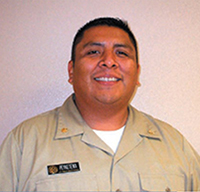 Why did you choose your specific health professional career?
Why did you choose your specific health professional career?
I chose my career based on my experience as a child and what my family was faced with at the time I was entering college. As I child I remember seeing two men outside the hospital wearing white Navy uniforms. I asked my mother, who they were? She told me they were doctors and they are the ones who make people feel better when they are sick. I wanted the same ability to help people feel better when they felt sick. When I finished high school and was entering college, my family suffered a loss when my great-grand mother passed away. At that time, there was not a full understanding of her ailment. This made my passion stronger to pursue a career in the health care field to try and understand what caused her death. I figured if I can educate myself in medicine, I could help my family in understanding what had happened and bring closure. Not only would I be helping my family but I would also be there for all the other Native American families who need assistance in understanding what ails them. I started college at the University of New Mexico, Gallup Branch. At that time there were basically only two health profession programs that interested me. I was either going to be a Nurse or a Medical Laboratory Technician. I chose the Medical Laboratory Technician program because I felt that provided a more in-depth, analytical based knowledge of how the body works.
What experiences did you have to make sure this profession was right for you?
I participated in a summer job program while I was in college that placed students in hospitals and clinics to experience what it was like to work among different health care professions. One summer, I worked as a certified nursing assistant (CNA) and this gave me insight to what a nurse does. During another summer I worked in a hospital laboratory that provided patient interaction and the analytical stimuli, which struck my interest a lot. The laboratory provided a comprehensive view of each patient with the laboratory results generated from testing patient specimens. This definitely was the best way to understand what was going on with a patient physiologically. This pretty much solidified my decision on becoming a Medical Technologist.
Describe any obstacles or barriers to success that you encountered along your health professional career path and how did you overcome them?
One obstacle that I had to overcome, and I’m sure most other students will have, is the financial need that came with attending college. When I started college, I was eligible for a tribal scholarship and a federal grant. With these I managed to cover the cost of tuition, books and fees. That left the hardship of trying to cover the cost of commuting over 80 miles round trip to and from school, and the cost of everyday life such as meals and other incidentals. I still remember the times when my mother and I shared meals from home in between classes because we could not afford to buy food at school.
What do you do in your current job?
I am a Commissioned Corps Officer with the U. S. Public Health Service, stationed at the Phoenix Indian Medical Center (PIMC). I’m the Clinical Chemistry Supervisor overseeing the sections of chemistry, urinalysis, serology, and molecular diagnostic testing. As the supervisor, I manage the operation of the department covering patient specimen testing, quality control, quality assurance, and staffing. I’m involved in recruitment of Medical Technologists, the training of new employees, and the implementing of new policies and procedures when necessary. Above all, my main responsibility is to provide the most accurate, reliable laboratory results for patient diagnosis.
What advice do you have for American Indian/Alaska Native students who are interested in health careers?
I would commend them for their interest in a health career because it takes a special person to care for a patient. If they see themselves as caregivers and have a strong passion to help others, do it. We need all the help we can get to care for each other.
Tribal Affiliation: Zuni
Current Position: Lieutenant Commander, U.S. PHS Clinical Chemistry Supervisor, PIMC, Phoenix, AZ
Health Professional Degree(s): Bachelor of Science in Clinical Laboratory Science
Schools Attended: University of New Mexico, 1998
Area of Focus/Specialty: Laboratory Manager
“It takes a special person to care for a patient.”

